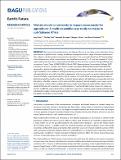Climate model uncertainty in impact assessments for agriculture: A multi-ensemble case study on maize in sub-Saharan Africa
Author(s)
Dale, Amy L.; Fant, Charles W; Strzepek, Kenneth; Lickley, Megan Jeramaz; Solomon, Susan
DownloadSolomon_Climate model uncertainty.pdf (20.61Mb)
PUBLISHER_CC
Publisher with Creative Commons License
Creative Commons Attribution
Terms of use
Metadata
Show full item recordAbstract
We present maize production in sub-Saharan Africa as a case study in the exploration of how uncertainties in global climate change, as reflected in projections from a range of climate model ensembles, influence climate impact assessments for agriculture. The crop model AquaCrop-OS (Food and Agriculture Organization of the United Nations) was modified to run on a 2° × 2° grid and coupled to 122 climate model projections from multi-model ensembles for three emission scenarios (Coupled Model Intercomparison Project Phase 3 [CMIP3] SRES A1B and CMIP5 Representative Concentration Pathway [RCP] scenarios 4.5 and 8.5) as well as two “within-model” ensembles (NCAR CCSM3 and ECHAM5/MPI-OM) designed to capture internal variability (i.e., uncertainty due to chaos in the climate system). In spite of high uncertainty, most notably in the high-producing semi-arid zones, we observed robust regional and sub-regional trends across all ensembles. In agreement with previous work, we project widespread yield losses in the Sahel region and Southern Africa, resilience in Central Africa, and sub-regional increases in East Africa and at the southern tip of the continent. Spatial patterns of yield losses corresponded with spatial patterns of aridity increases, which were explicitly evaluated. Internal variability was a major source of uncertainty in both within-model and between-model ensembles and explained the majority of the spatial distribution of uncertainty in yield projections. Projected climate change impacts on maize production in different regions and nations ranged from near-zero or positive (upper quartile estimates) to substantially negative (lower quartile estimates), highlighting a need for risk management strategies that are adaptive and robust to uncertainty.
Date issued
2017-03Department
Massachusetts Institute of Technology. Center for Global Change Science; Massachusetts Institute of Technology. Department of Chemistry; Massachusetts Institute of Technology. Department of Earth, Atmospheric, and Planetary Sciences; Massachusetts Institute of Technology. Institute for Data, Systems, and Society; Massachusetts Institute of Technology. Joint Program on the Science & Policy of Global Change; MIT Energy InitiativeJournal
Earth's Future
Publisher
Wiley Blackwell
Citation
Dale, Amy, Charles Fant, Kenneth Strzepek, Megan Lickley, and Susan Solomon. “Climate Model Uncertainty in Impact Assessments for Agriculture: A Multi-Ensemble Case Study on Maize in Sub-Saharan Africa.” Earth’s Future 5, no. 3 (March 2017): 337–353.
Version: Final published version
ISSN
23284277